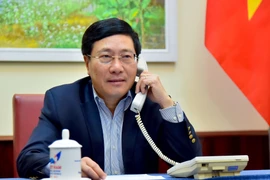Sydney (VNA) – Scientists from Australia’s University ofTechnology Sydney (UTS) and its partners in Vietnam are stepping up activitiesto carry out cooperation projects between the twosides amidst the COVID-19 pandemic.
UTS Rapido Vietnam: Industry 4.0 for sustainable water systems is funded by theAustralian Government’s Aus4Innovation Innovation Partnership Grants scheme, aninitiative of the Australian Government and managed by the CSIRO.
The project equips Vietnamese universities and research instituteswith the knowledge and tools to capitalise on their research potential,empowering them to produce working prototypes, and in turn making innovativetechnologies more accessible to the economy – particularly to small and medium-sizedenterprises (SMEs).
A key aim of the project is to demonstrate the UTS Rapidomodel of technology transfer through pilot activities that introduce newtechnologies to water systems in two different regions of Vietnam.
In Xuan Dai bay, the south-central province of Phu Yen, researchers from UTSand Ho Chi Minh University of Technology (HCMUT) have launched a seawaterenvironment monitoring system that employs cutting edge technology in robotics,Internet of Things (IoT), data analytics and mechatronics. The first of itskind in Vietnam, it is among very few worldwide that can provide real-timeoffshore environmental measurements in hostile conditions that includesaltwater corrosion and seasonal heavy tropical storms.
In the Hong (Red) River delta, improved designs for water filtration systemsare increasing access to drinking water for households and communities, whileUTS researchers and their local industry partners are working with VietnamNational University – University of Engineering and Technology (VNU-UET) tointegrate sensing technology with the new systems.
An automated treatment plant, currently under construction,will bring brand new technology to peri-urban Hanoi and build capacity in localindustry, allowing them to manufacture similar systems and tap in to themanufacturing ability of Vietnam.
"The delivery of the seawater environment monitoringsystem and the water filtration systems during this uncertain time stronglyproves UTS deep engagement with partners in Vietnam through our joint researchcenters with VNU-UET in Hanoi and HCMUT in Ho Chi Minh City. Addressing theinternationally emerging challenges in ocean environment and in ground waterpollution, the project again highlights the unique strength and impact of UTSpractice-oriented research not only in Vietnam but globally," said Prof.Ian Burnett, Dean of the Faculty of Engineering and Information Technology, UTS.
COVID-19 was an entirely unforseen disruption to the project,as it was for the rest of the world.
Nonetheless, the nature of the project and its objectiveshave allowed it to navigate and even take advantage of restrictions andobstacles imposed by the pandemic, finding new ways to collaborate and engagewith industry, and fostering independence in the pilot Rapido teams establishedin Vietnam.
Due to international travel bans, teams of researchers fromUTS and partners VNU-UET and HCMUT have worked remotely to plan and implementproject activities. Teams in Vietnam have also navigated local travel bans andrestricted access to project sites, which are located at a distance from theuniversity hubs in Hanoi and Ho Chi Minh City.
The impact of the pandemic has meant adapting to a ‘newnormal’, where timelines and deliverables are reevaluated and, in some cases,reimagined – and there have been plenty of opportunities to innovate.
The team delivered a virtual technology transfer workshopearly on, harnessing the opportunities presented by teleconferencing platformsand social media networks to extend the reach of the training beyond what wasinitially planned.
A new technology transfer unit, HCMUT Rapido, harnessed theresearch capabilities of HCMUT to develop an IoT-enabled ventilator at theheight of the pandemic in Vietnam. This project, the first self-containedproject under the new Rapido Vietnam model, demonstrated the agility anduser-focus that are characteristic of the Rapido model.
The COVID-19 pandemic has produced disastrous economic andpublic heath outcomes globally. Yet in this case, it has enabled the growth ofHCMUT Rapido, which grasped the opportunity to innovate and test their newcapabilities.
HCMUT Rapido has gone on to deliver additional projects whichaddress the impact of the virus, from online learning tools that demonstratehow Industry 4.0 technologies can help fight COVID-19, to an ATM which catersto people who are experiencing financial hardship due to the pandemic, whileadhering to social distancing.
“The teams behind UTS Rapido Vietnam have effectivelyadjusted to COVID-19 restrictions and adapted to the new normal, embracingopportunities to find new ways of doing things in both Australia and Vietnam.This success in navigating the pandemic to deliver the aims of the project canbe attributed to the deep working relationships between the Australian andVietnamese partners, built over many years of close collaboration.” said Prof.Eryk Dutkiewicz, UTS Chief Investigator.
The strong and cooperative relationships that drive UTSRapido Vietnam leave it exceptionally well-placed to deliver on its aimsthroughout the ongoing pandemic, as partners work closely to tailor the UTSRapido model to Vietnam and establish a blueprint for technology transfer thatcan be applied to the entire country.
“By working closely with our partners in Vietnam, we areembedding an innovative technology development and transfer model to thecountry’s technology start-up ecosystem, starting from universities and R&Dinstitutes,” said Dr. Diep N. Nguyen, UTS Co-Investigator./.




























